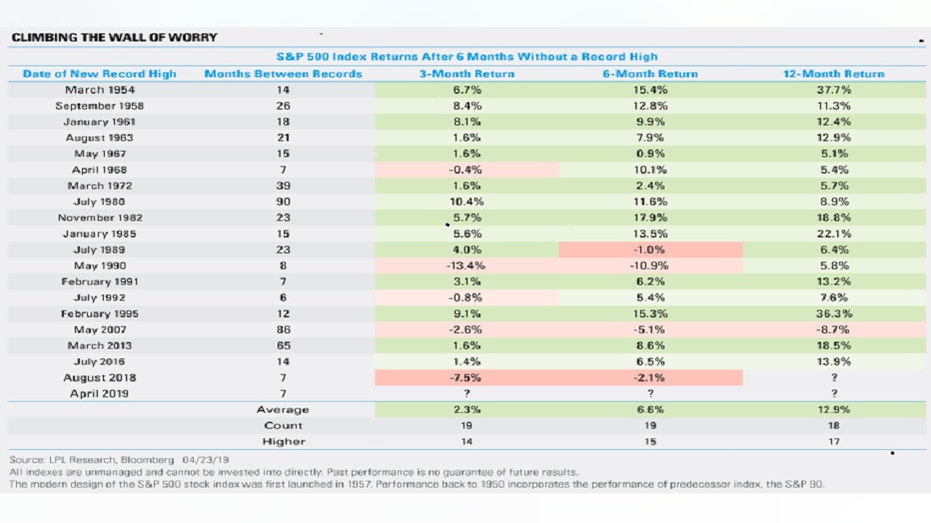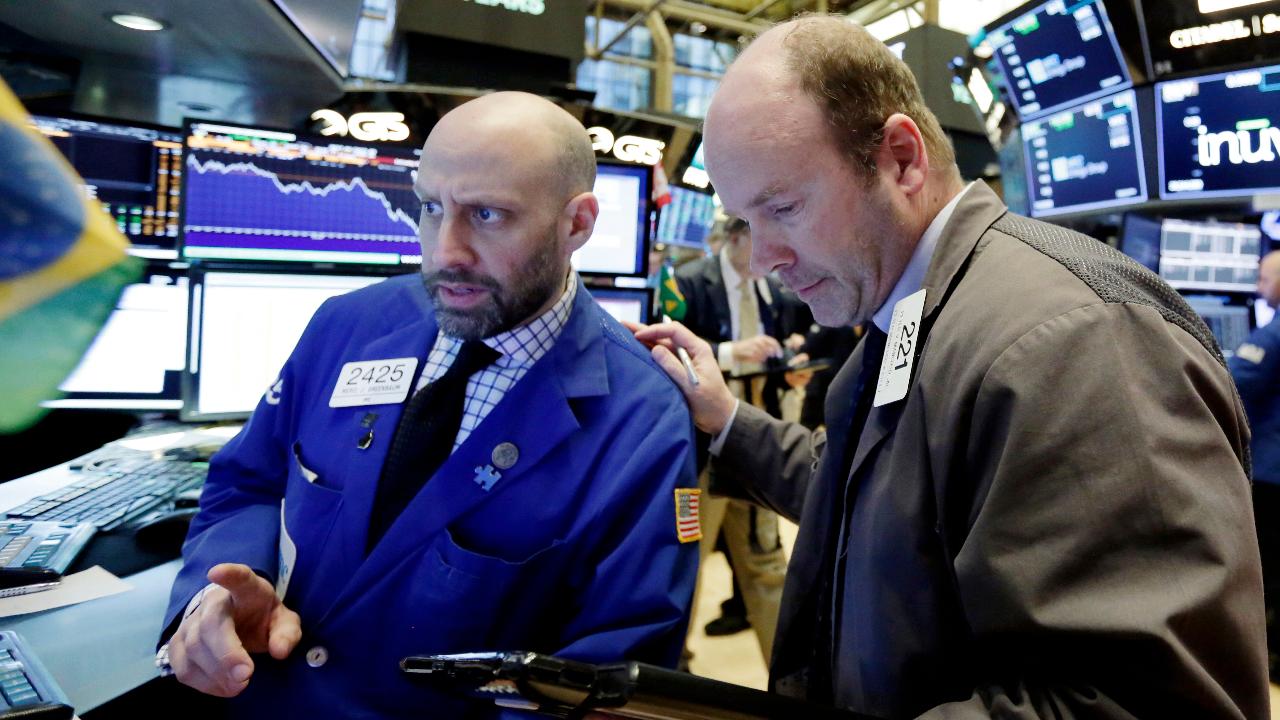US stocks close down after record-setting gains
U.S. stocks closed slightly lower on Wednesday, following record-setting gains the day before, on mixed quarterly reports and concerns about the strength of the global economy. The Nasdaq Composite hit an intra-day record high and was on track for its second straight record close.
The declines came as investors eyed German business sentiment, which dropped in April, indicating that Europe’s biggest economy continues to weaken. Investors also gauged the possibility that Beijing may slow the pace of policy easing following a report that China's economy posted a surprisingly strong first-quarter growth.
Corporate earnings were mixed before Wednesday's opening bell. Caterpillar reported record first-quarter results amid higher sales, results that could ease some concerns over the prospects of a global economic slowdown given the firm’s sprawling international operations. Revenue at the Deerfield, Illinois-based company rose to $13.5 billion in the three months through March, beating analyst projections. Meanwhile, profits were $1.9 billion, or $3.25 per share, higher than Wall Street anticipated.
On the other hand, Boeing earnings fell in the first quarter as the beleaguered Chicago-based manufacturer looks to overcome the fallout after one of its most popular planes was involved in two recent crashes, leading to a global halt in operations and hiatus on new orders. However, shares rose because investors got a specific figure, $1 billion, on how much the aerospace giant's 737 Max jet crisis will cost the company.
AT&T shares dropped after the company reported first-quarter earnings of $4.1 billion. Adjusted earnings per share were 86 cents per share, topping analyst expectations. However, revenue was $44.83 billion, below expectations.
Shares of Anadarko Petroleum shot higher after Occidental Petroleum submitted a bid for the crude oil and natural gas producer that tops an offer Chevron made last week.
| Ticker | Security | Last | Change | Change % |
|---|---|---|---|---|
| APC | NO DATA AVAILABLE | - | - | - |
| BA | THE BOEING CO. | 243.03 | +6.08 | +2.57% |
| CAT | CATERPILLAR INC. | 725.98 | +47.95 | +7.07% |
| T | AT&T INC. | 27.13 | -0.18 | -0.66% |
On Tuesday, stocks closed at an all-time high as better-than-expected quarterly profits from some of the largest companies encouraged investors. The benchmark S&P 500 index rose 17 percent, its best start to a year since 1987, while the Nasdaq has gained 22 percent, its best start since 1991. The Dow remains about half a percentage point from its record last October.
Tuesday’s move to a record high for the benchmark S&P 500 index and the Nasdaq index comes less than six months after a sharp decline in late December, which led the S&P 500 to its worst annual performance since 2008 But stocks quickly recovered in the past three months as the Federal Reserve stopped raising interest rates and the Trump administration said it was making progress on a trade deal with China.
Explanations for the record-setting session vary, but Greg McBride, Bankrate chief financial analyst, said Wednesday the Federal Reserve's capitulation on rate hikes is key.
“Fed Chair Jerome Powell removed the barricade and opened the expressway to S&P 2930 when he first uttered the word ‘patient’ on January 4. And sure enough, investors barreled right on through, pushing the market up nearly 20 percent since," McBride said in a statement.
| Ticker | Security | Last | Change | Change % |
|---|---|---|---|---|
| I:DJI | DOW JONES AVERAGES | 50115.67 | +1,206.95 | +2.47% |
| SP500 | S&P 500 | 6932.3 | +133.90 | +1.97% |
| I:COMP | NASDAQ COMPOSITE INDEX | 23031.213218 | +490.63 | +2.18% |
“The questions will be asked, 'Is now the time to get in?' or 'Is now the time to get out?' Look at the big picture -- the economy is in solid shape, the labor market is the tightest in 50 years and getting tighter, and interest rates are low. But this market is not a bargain-hunter’s paradise. Be prepared for a return of volatility and for returns to be harder-earned than what we’ve seen thus far in 2019. The stock market may have returned to record highs, but don’t neglect other parts of your portfolio. Cash currently earns more than the rate of inflation and is both a good diversifier and an attractive parking place while seeking out compelling values.”
Analysts said prospects for further equity gains appear strong.
“With the S&P and Nasdaq hitting new highs, the market recovery from the downturn at the end of last year is now complete, and despite the economic concerns, investors have clearly signaled they expect continued growth. With markets breaking out again, the likelihood of further gains is high, especially if earnings continue to come in ahead of expectations,” Brad McMillan, chief investment Officer for Commonwealth Financial Network, said. “Many of the concerns that took markets down in the fourth quarter have faded. The Mueller report was less damaging than feared; Brexit has turned from tragedy to farce; and for all the worries about growth and corporate earnings, both seem to be beating expectations. With the passing of much of the worry, markets may be now free to keep moving higher.”

Other analysts said the pace of the current rally could signal higher volatility.
"We’ve maintained that the late-2018 sell-off was overdone, and we see a compelling case for equities near these levels based on sound economic fundamentals," Ryan Detrick, senior market strategist for LPL Financial. "However, the recovery has been arguably a bit fast considering some of the reasons for the decline have yet to be resolved. We think the S&P 500 could eventually move higher and make a run at our 3,000 fair value target, but we wouldn’t be surprised to see volatility pick up over the next few months."
Crude oil prices for U.S. benchmark West Texas Intermediate (WTI) were 41 cents lower at $65.89 per barrel. The slight pullback in WTI prices came after the Energy Information Agency said crude oil inventories rose by an unexpectedly large 5.5 million barrels at the end of last week.
Europe's benchmark crude oil, Brent blend, closed 6 cents higher at $74.57.
WTI is hovering just below a 6-month high touched Tuesday on supply concerns in reaction to Monday’s announcement by the U.S. that it would end sanctions that allowed some nations to import Iranian oil. The markets were already nervous about tight supplies resulting from output cuts by OPEC, Russia and others.
CLICK HERE TO GET THE FOX BUSINESS APP
The 10-year Treasury yield, which moves in the opposite direction of its price, slipped fractionally to 2.52 percent. It was the yield's fourth decline in the last five trading sesssions. Year to date the yield is down 0.16 percent.
The decline came after Ifo Institute data showed a business confidence in Germany declining more than expected in April, sliding to the lowest level since 2016, according to Dow Jones. Separately, a report indicated that confidence among French manufacturers came in lower than expected. Bond prices also got a lift from the Bank of Canada, which said the weakening outlook for domestic and global growth has caused it to put aside its bias toward raising interest rates.
China’s Shanghai Composite closed up 0.09 percent, the Hang Seng finished off 0.53 percent and Japan’s Nikkei 225 ended down 0.27 percent.
Britain’s FTSE 100 was off 0.55 percent, France’s CAC 40 was down 0.34 percent and Germany’s DAX rose 0.66 percent.




















